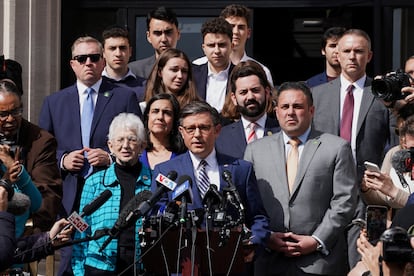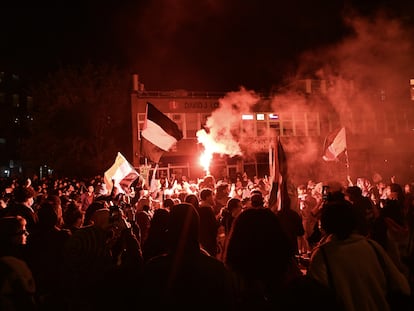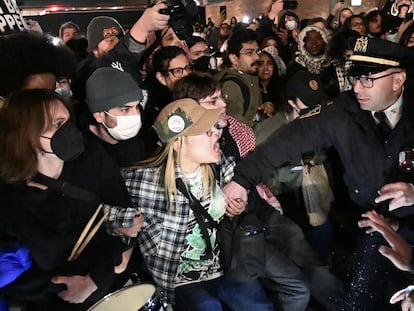Columbia visit by House Speaker Mike Johnson raises tension with students mobilizing for Gaza
The Republican official called for the resignation of university president Nemat Shafik ‘if she cannot immediately bring order to this chaos’ and did not rule out bringing in the National Guard


With the political class now wading into the battle over the pro-Palestine campus protests, together with the emergence of students’ demands in the lives and agendas of important congresspeople, the United States is witnessing the biggest mobilization in its universities since the war broke out in Gaza, and probably also since the days of the anti-Vietnam War protests. House Speaker Mike Johnson, the country’s third-top authority, together with representatives of his Republican Party, on Wednesday visited the Columbia University campus, where hundreds of students are still camped in solidarity with Palestine. Columbia has become the epicenter of a massive mobilization from coast to coast.
Johnson, who is an evangelical Christian — a faith that unswervingly supports Israeli hawks — met with Jewish students on campus who say they feel unsafe because of the protests, and took the opportunity to call for the resignation of Columbia’s president, Nemat Minouche Shafik, for being unable, in his opinion, to properly handle a mobilization that began in October and now threatens to take its toll on President Joe Biden with just a few months left before the presidential election.
During a tense address repeatedly interrupted by students, who booed Johnson several times, the speaker said: “We just can’t allow this kind of hatred and antisemitism to flourish on our campuses, and it must be stopped in its tracks. Those who are perpetrating this violence should be arrested. I am here today joining my colleagues, and calling on President Shafik to resign if she cannot immediately bring order to this chaos.”
The speaker also said he would talk to President Biden and did not rule out bringing in the National Guard. “There is executive authority that would be appropriate. If this is not contained quickly, and if these threats and intimidation are not stopped, there is an appropriate time for the National Guard,” he said. “We have to bring order to these campuses.”
Johnson’s risky incursion into a Democratic enclave like Columbia also has an internal reading, since the speaker is facing an avalanche of conservative criticism in the House and a handful of fellow Republicans led by Georgia Congresswoman Marjorie Taylor Greene are threatening to oust him. The amplifying effect of the Palestine protests provides Republicans with a new weapon against Democrats in the middle of the election campaign.
Johnson’s visit to the Columbia campus came a few hours after a massive sit-in outside the home of Chuck Schumer — the Democratic majority leader in the Senate and the highest-ranking Jewish official — ended late Tuesday with more than 200 arrests. The protest, organized by the progressive group Jewish Voice for Peace, whose activity was banned by Columbia last year, demanded that the United States stop providing military aid to Israel: this is now the main demand of the activists. Columbia University Apartheid Divest — an umbrella group that brings together more than 100 Columbia student associations and describes itself as “a coalition of student organizations that see Palestine as the vanguard for our collective liberation” — also includes another capital demand from students: that universities divest from companies linked to Israel. Furthermore, and as a condition for giving up their protests, they demand that students who were suspended or disciplined for their participation in the protests be readmitted.
University administrators have extended the deadline for negotiations with the protesters by 48 hours to try to peacefully dismantle the encampment, while the students agreed to remove “a significant number of tents,” according to a statement from the university that has not been confirmed by the organizers of the encampment. Columbia confirmed this Wednesday that final exams will also be held online.
Protests increase pressure on Biden
Among the pro-Palestinian protesters, it is no longer even necessary to ask for a ceasefire, a demand that has been incorporated by the White House, although without saying as much: by abstaining at the United Nations Security Council in a recent vote, Washington allowed the adoption of the first ceasefire resolution at the U.N., but immediately neutralized it by calling it “non-binding.” Biden’s change of position towards Israel became theoretically clear after the tens of thousands of punishment votes received in the Democratic primaries, mostly from voters of Arab and Muslim descent who are decisive in states like Michigan. This change was confirmed by his repeated warning to Israeli Prime Minister Benjamin Netanyahu that an invasion of Rafah would be a humanitarian disaster of incalculable proportions, and his request that Israel allow more aid to reach the Strip. But the campus protests, which have not stopped despite police evictions, are increasing the pressure on the Democratic candidate for re-election. Especially when he receives friendly fire, such as the address by progressive Democratic Congresswoman Ilhan Omar in support of students on Tuesday at the University of Minnesota.
Politics also runs through the demonstrations around the campuses. At the meeting held on Tuesday night at one of the entrances to Columbia, with the subway entrances closed amid an endless battery of fences and more riot police than participants, representatives of 30 groups spoke, mostly from the Arab and Muslim community in New York, as well as a minority of Jews. Some speakers had no ties to the university, but expressed support for the campers. “This is not only a fight for Palestine, it is also a fight for the United States, for our civil rights and for our freedoms. It is a fight for freedom of expression and against authoritarianism,” said one of them. At the end of the rally, the slogan that many Jewish students consider antisemitic for supposedly inciting the expulsion of Jews from Israel was chanted: “From the river [Jordan] to the sea, Palestine will be free.”
The repression of the protests at Columbia and many other American campuses, from Yale to New York University or those in Berkeley, Ohio or Texas — where this Wednesday special troops dispersed the students — is seen by those involved as a constitutional outrage. The same view is held by hundreds of faculty members who have come out to support the students. “I was horrified to see Columbia calling the police to arrest non-violent students protesting in solidarity with Gaza. University campuses should be a space for freedom of expression and academic research,” explains Bassam Khawaja, a professor of law. “Bringing in riot police to remove students camping on the grass, suspending them en masse without due process, and evicting them from their residences are draconian, over-the-top reactions. I am also deeply concerned that this administration is treating Palestinian human rights defenders especially harshly.”
The police had not intervened in Columbia since 1968, in the midst of the response to the Vietnam War.
Sign up for our weekly newsletter to get more English-language news coverage from EL PAÍS USA Edition
Tu suscripción se está usando en otro dispositivo
¿Quieres añadir otro usuario a tu suscripción?
Si continúas leyendo en este dispositivo, no se podrá leer en el otro.
FlechaTu suscripción se está usando en otro dispositivo y solo puedes acceder a EL PAÍS desde un dispositivo a la vez.
Si quieres compartir tu cuenta, cambia tu suscripción a la modalidad Premium, así podrás añadir otro usuario. Cada uno accederá con su propia cuenta de email, lo que os permitirá personalizar vuestra experiencia en EL PAÍS.
En el caso de no saber quién está usando tu cuenta, te recomendamos cambiar tu contraseña aquí.
Si decides continuar compartiendo tu cuenta, este mensaje se mostrará en tu dispositivo y en el de la otra persona que está usando tu cuenta de forma indefinida, afectando a tu experiencia de lectura. Puedes consultar aquí los términos y condiciones de la suscripción digital.









































